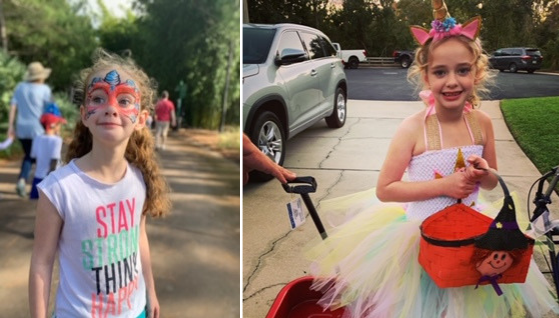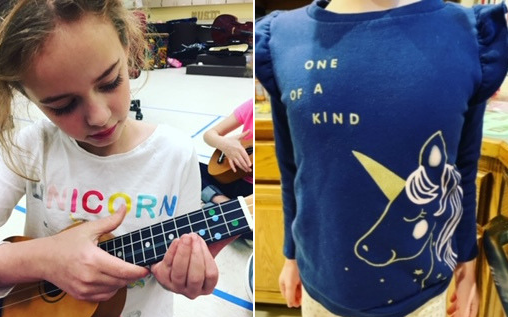 At 39, I found myself the mother of a 14-year-old. My husband and I had finally given up after years of trying for a second child, and I was scheduled for a hysterectomy. However, since the timing of these things does not always belong to us, my pre-op bloodwork put a sudden halt on the procedure scheduled for a mere eight days later.
At 39, I found myself the mother of a 14-year-old. My husband and I had finally given up after years of trying for a second child, and I was scheduled for a hysterectomy. However, since the timing of these things does not always belong to us, my pre-op bloodwork put a sudden halt on the procedure scheduled for a mere eight days later.
Instead of having a party when I turned 40, I had a sweet little baby girl unicorn. I know what you are thinking, a unicorn? That had to be an uncomfortable delivery! Actually, it was pretty uneventful except for the true knot tied in her umbilical cord, which is fairly rare. For the first 16 or so months, she pranced along quite normally past every milestone, sometimes ahead of schedule. Then everything changed, everything — all forward momentum ceased. It took me about six months to finally form the words “I’m worried,” and then say them out loud to my pediatrician. Evaluations, language therapy, occupational therapy, and feeding therapy began with haste. My background is in early childhood education and I knew early intervention was key; I was beating myself up for being in denial those six months while the horn grew. I knew clearly what the diagnosis would be and that the path of our family’s journey would be altered going forward. Autism.
The dictionary defines a unicorn as something unusual, rare or unique. This is in addition to the more common description of the mythical, magical creature with a long, lustrous mane and often a horn growing from its forehead. When these are combined, they easily become the perfect term to describe our now 7-year-old little girl. She is nothing if not a mystery, smarter than smart with an unusual memory but delayed in language and emotion. The happiest of unique beings with a side of spice and sass. Inquisitive without always being able to ask the right question. Wonderfully kind to everyone and a model of politeness. She even has a beautiful “mane” of curly, strawberry blonde hair. Then there’s the horn — a passerby probably wouldn’t even notice it and even though it can be sharp and pointy, it makes her who she is and we have grown to fully embrace it: a person who needs routines, who will obsessively ask a question over and over until she gets the answer she wants, a person who will not wear jeans because they itch, who hates loud noises or being startled, a person who does not always comply the first, second or fifth time she is asked to do or stop doing something. There are a lot of different twists that make up that horn.

But with that horn came the magic. I have over 25 years of experience in educating young children and I pride myself on understanding and accepting the uniqueness of all children. I have spent countless hours counseling teachers and families on the ways in which we can work to meet the needs of all. A micro-fraction of those years of training and all that experience prepared me for raising my own unicorn. Even though we took action early, I was still dazed and confused, trying to navigate a system of resources and not knowing truly where to turn. I read and asked questions and cried and ate doughnuts and researched and asked more questions and cried. I was a hot mess. Finding other moms who were sharing their own truths helped me begin to really see mine. I started taking what I knew and applying it to what I was seeing in my girl and gained a whole new appreciation for families who are raising these magical and amazing children. Looking back, I realize there were several key things I had never given much consideration to prior.
Things You Need to Know About Families Raising Unicorns
I have yet to find a child that came with a manual, much less one with a chapter on dealing with autism spectrum disorder. You could forget a chapter being sufficient anyway because every single child with autism I have ever met is different from every other. There may be similarities within a small subset of health problems or developmental issues or characteristics or behaviors, but by its very nature as a spectrum of disorders, it would be better characterized in a volume of mythology. Parents of children with autism are not experts. We do not always know the exact right way to avoid that meltdown or handle that tantrum. We are constantly trying to figure out our child because they are constantly changing, so keeping all your judgment tucked in is essential. It’s best not to offer advice unsolicited — mouth closed and eyes and nose up are best. I recently used a brief encounter to kindly educate someone who was probably around during the Battle of Gettysburg about “picking my battles” with our unicorn when her horn was poking out just a little.
There are costs associated with raising a child with autism that are unexpected. Routine medical and dental work that requires sedation so the work can be performed. A myriad of therapies beyond what our public schools can provide but that are making a difference in the academic, emotional, physical, spiritual and social lives of our children. Special equipment including fidgets, balls, vests and weighted blankets. Insurance barely covers a fraction of the costs, if at all, and the copays and out-of-pocket expense alone can put a family into debt for years. Heaven forbid you want to try a more functional approach and change up diet or use a nutritional supplement instead of a prescription — there is zero help from insurance there. We were recently denied financial support for required and costly sedation dental work from an organization because our daughter’s IQ was too high. Really. That is a real thing.
Parents of children with autism live life on the edge, even the ones who look like they have it all under control. We are weighing every option all day long, anticipating every move and preparing for a countermove based on any potential reaction. We’re planning out meals and medicines and schedules that include therapies and groups and elaborate routines. We may be filled with anxiousness every time we walk into a store, restaurant or church. We feel inadequate because we don’t always know exactly what to expect or to say or do. We are attached all the time. We are trying to decipher a code that only unicorns understand, folks. It is exhausting. We need help but we may not ask for it. We need to talk. We need to go to the grocery store alone. We need a date night with our spouse. We need to go to the bathroom without worrying if the front door is locked. We need a break every so often. I would be a walking lunatic if it weren’t for my friends!
All parents think about their kid’s future. We wonder who they will grow up to be and the path they will take to get there. A parent of a child with autism faces the future with a whole different perspective. Questions such as, Who will they fall in love with? Will they have kids? Will they be able to tell the bad people from the good? Will they be able to live independently? Those questions may very well be answered with “no,” and we have to face figuring out how to plan for a future where fate may dictate that we are not a part of it. Often in these families, the siblings have to stand ready to step in to provide what could be lifelong care. It is my single greatest fear — what will happen to her if something happens to us? This gut-wrenching reality is compounded by the fact that we are older parents. It starts becoming hard to breathe just writing about it.
A little over a year ago I turned to the one thing that started helping me make sense of this precious little magical creature I did not fully understand — I started writing about her. Last April I began a series of daily posts tagged #30facesofautism in an effort to share the different facets of our journey for Autism Awareness Month. My goal was to help others accept, understand and love. If it helped even one other person feel like they were not alone or one person feel more tolerant or less judgmental, then I considered it a success. Turns out, it connected me to other mothers out there trying to figure it all out with their own little unicorns. I could not wait for April to get here this year — there is so much more story to tell. Autism may have changed our path, but being a unicorn mom has changed me as a human, one who appreciates the myth and loves the magic of the most unique, rare creature in the land, horn and all.
About the Author
 Susan Phillips was born and raised a small town girl in Conway, South Carolina, but moved to Jacksonville over 25 years ago after meeting her husband and graduating from Clemson University. Becoming a Kindergarten teacher fulfilled a childhood dream but a calling to lead the learning community where she had been teaching awakened a passion she did not know existed. As the Principal of Chets Creek Elementary, Susan has had the privilege of serving thousands of families over the past 16 years. Susan and her husband have two girls, a Senior at Clemson and a sweet little “unicorn” in second grade. Susan is committed to using her family’s journey to raise awareness and help others accept, understand, and love with posts tagged #30facesofautism that highlight the many different facets or “faces” of autism.
Susan Phillips was born and raised a small town girl in Conway, South Carolina, but moved to Jacksonville over 25 years ago after meeting her husband and graduating from Clemson University. Becoming a Kindergarten teacher fulfilled a childhood dream but a calling to lead the learning community where she had been teaching awakened a passion she did not know existed. As the Principal of Chets Creek Elementary, Susan has had the privilege of serving thousands of families over the past 16 years. Susan and her husband have two girls, a Senior at Clemson and a sweet little “unicorn” in second grade. Susan is committed to using her family’s journey to raise awareness and help others accept, understand, and love with posts tagged #30facesofautism that highlight the many different facets or “faces” of autism.


















THANK YOU!!!!
Beautifully written, Susan! ?
God Bless you and your beautiful family. Thank you.
Love this and her so much!!!
You have an amazing ability to share your story and reach wide. Thank you❤️
Great life story!❤️ Love you and your family!?